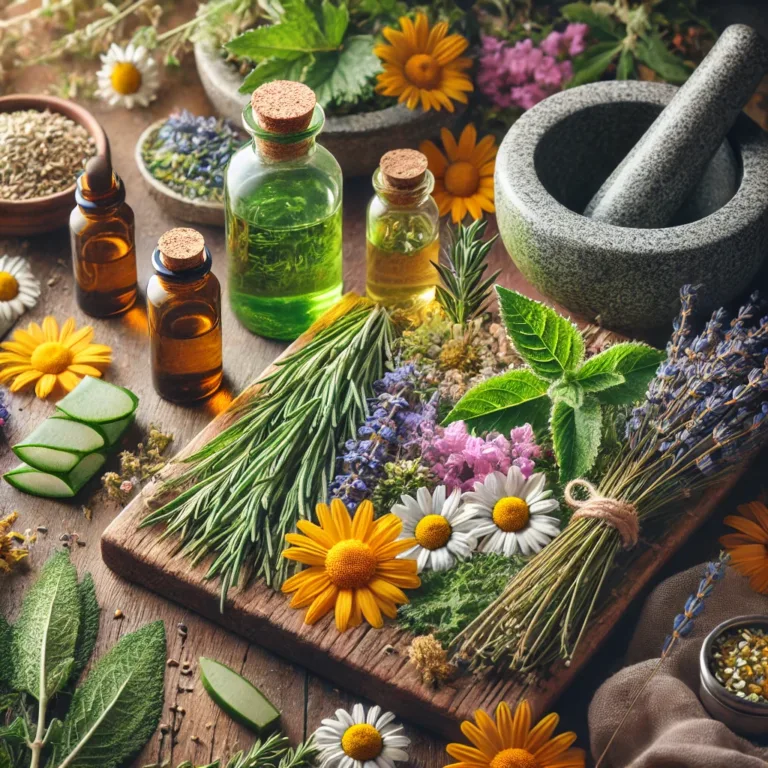Herbs have been used for centuries to treat a variety of skin conditions, including acne. With their natural anti-inflammatory, antibacterial, and soothing properties, herbs can be an effective and gentle way to treat acne without harsh side effects. Let’s explore the best herbs for acne and discover natural remedies that can help you achieve clear, healthy skin.
1. Tea Tree Oil: A Potent Antibacterial Solution
Tea tree oil is one of the best herbs for treating acne due to its potent antibacterial properties. It contains terpinen-4-ol, which fights acne-causing bacteria and reduces swelling. This herb offers a natural alternative to synthetic treatments and can be used as a spot treatment to unclog pores and prevent future breakouts.
How to Use: Dilute a few drops of tea tree oil in a carrier oil like coconut or jojoba oil, then apply it directly to acne-prone areas using a cotton swab. Never apply undiluted tea tree oil to your skin, as it can cause irritation.
Benefits: Tea tree oil’s antibacterial properties help fight acne-causing bacteria, reduce redness and swelling, and prevent further breakouts. It’s one of the most popular and effective natural remedies for treating acne.
2. Aloe Vera: The Ultimate Soother
Aloe vera is well-known for its ability to treat acne naturally, especially for inflamed or sensitive skin. This herb contains antioxidants, vitamins, and minerals that help calm irritated skin, reduce redness, and promote healing. It’s one of the best herbs for acne when it comes to soothing and moisturizing the skin.
How to Use: Apply pure aloe vera gel directly to acne-prone areas or mix it with other ingredients like honey for added benefits. You can also find aloe vera in various over-the-counter skincare products.
Benefits: Aloe vera’s anti-inflammatory and hydrating properties help soothe irritated skin, reduce redness, and speed up the healing process. It’s gentle enough for daily use and ideal for those with sensitive skin.
3. Chamomile: The Calming Herb
Chamomile is rich in antioxidants and offers a natural remedy for treating acne. This herb helps reduce redness, inflammation, and irritation caused by acne. Additionally, chamomile can speed up the skin’s healing process, making it particularly useful for reducing acne scars and blemishes.
How to Use: Brew a cup of chamomile tea and let it cool. Apply the tea to your skin using a cotton pad as a toner or use chamomile-infused skincare products. Drinking chamomile tea can also help calm inflammation from the inside out.
Benefits: Chamomile reduces inflammation, calms irritated skin, and helps heal acne scars. Its antioxidant properties also protect the skin from environmental damage, making it one of the best herbs for clear skin.
4. Lavender: The Balancer
Lavender has a well-deserved place in natural skincare, particularly for acne-prone skin. With its antimicrobial and anti-inflammatory properties, lavender helps balance oil production, reduce acne-causing bacteria, and calm the skin. Additionally, lavender’s calming scent can relieve stress, which is a common trigger for acne flare-ups.
How to Use: Dilute lavender essential oil in a carrier oil and apply it to acne spots. You can also add a few drops to your favorite face mask or toner. Lavender’s soothing properties make it great for both topical and aromatherapy uses.
Benefits: Lavender helps balance oil production, reduce bacteria, and calm irritated skin. It also reduces stress, making it an ideal herb to discover natural remedies for stress-induced acne.
5. Calendula: The Skin Healer
Calendula, also known as marigold, is one of the best herbs for acne due to its strong anti-inflammatory and healing properties. It’s particularly effective at reducing redness, soothing inflamed skin, and helping to heal acne scars. Calendula also works as a gentle antimicrobial, helping to prevent acne from recurring.
How to Use: Calendula can be found in creams, oils, or teas. Apply calendula cream or oil directly to acne-prone areas or use calendula-infused products to reduce inflammation and promote skin healing.
Benefits: Calendula’s anti-inflammatory properties help soothe irritated skin and reduce redness. It also promotes faster healing of acne scars and blemishes, making it a powerful yet gentle remedy for those looking to discover natural results for acne treatment.
Conclusion
Incorporating these herbs for acne into your skincare routine will allow you to naturally and effectively clear your skin while improving its overall health. Whether you choose to use them as essential oils, teas, or in topical treatments, these herbs offer gentle, effective solutions for acne-prone skin. By choosing herbal remedies like tea tree oil, aloe vera, chamomile, lavender, and calendula, you can discover natural remedies that work for you without the harsh side effects of conventional treatments. By harnessing the power of nature, you can achieve clearer, healthier skin in a gentle, holistic way.

